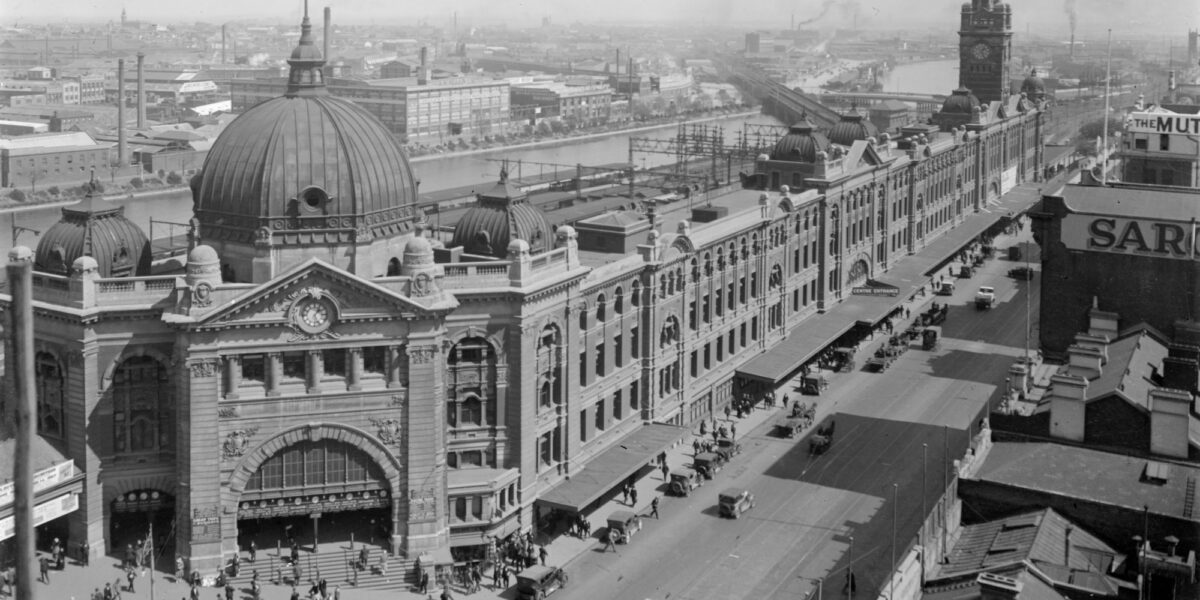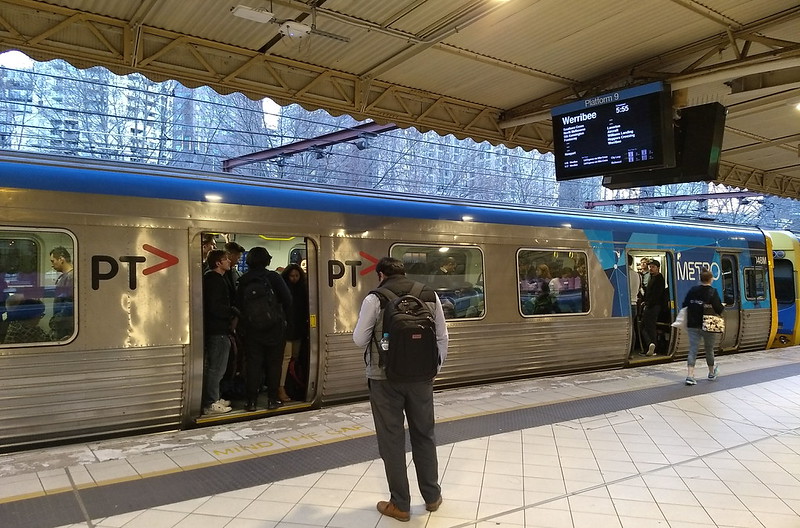Melbourne’s suburban train system was originally steam operated, but was converted to electricity in the 1910s and 1920s. By about 1930 most of the network we know today was in place.
My friend Andrew leant me a copy of the suburban 1924 timetable. I’ve also got a PDF of the 1974 timetable. So let’s compare the train service from 100 and 50 years ago to the present day.
Bear in mind that back in 1924, the working week was Monday to Friday, plus Saturday morning. This meant that Saturday train services had peak periods in the morning and at lunchtime to cater for that demand. (To this day, there are bus services that still run only until lunchtime on Saturday.)
In 1924, on Sunday trains had a handful of services around 10am, then stopped again until about 1pm, and finished on Sunday night around 10pm – rather than midnight as on weekdays and Saturdays.
I’ll do this line by line, going clockwise around the network, starting with the lines through Newport to Williamstown and Werribee (including the Altona Loop).
Williamstown line
Until 1987 the Williamstown line went slightly further than today, to Williamstown Pier station. Not all trains served this station – basically a few each peak hour presumably to serve dock workers, and some on weekends for day trippers to the area. Most trains only went as far as Williamstown station, the current terminus.
It’s also worth noting that until 1976 when expansion to four tracks was completed, one track pair was shared by all trains between the City and Footscray station. (The Bunbury Street tunnel serves standard gauge freight and long distance trains, but these do not stop at Footscray.)
Regional Rail Link was completed in 2015, and included further expansion to six tracks: two for the Sunbury line, two for V/Line trains to the Bendigo, Ballarat, Geelong lines, and two for the Werribee, Altona and Williamstown lines.
So, comparing the timetables:
| Williamstown line | 1924 | 1974 | 2020 |
|---|---|---|---|
| Service pattern | Most trains through-routed to/from Frankston or Dandenong/Pakenham. | Most trains still through-routed to/from Frankston or Dandenong/Pakenham. | Now run in conjunction with the Werribee line and Altona Loop. Weekday daytime: trains to the city, mostly through-routed to/from Frankston Evenings and weekends: shuttles Williamstown to Newport |
| Running time (Outbound midday) | Flinders St-Williamstown: 27 minutes +2 minutes to Williamstown Pier | Flinders St-Williamstown: 27 minutes | Flinders St-Williamstown: 27 minutes |
| Peak hour | About every 10-12 minutes | About every 12-15 minutes | About every 22 minutes |
| Weekday off-peak | Every 20 minutes | Every 20 minutes | Every 20 minutes |
| Weekday evenings | About every 20 minutes until midnight | Every 20 minutes until midnight | Every 20 minutes until 10pm (shuttle), then every 30 minutes (shuttle) |
| Saturday off-peak | Every 20 minutes | Every 20 minutes | Every 20 minutes (shuttle)* |
| Saturday evening | Every 20 minutes | Every 20 minutes | Every 30 minutes (shuttle) |
| Sunday morning | Two services around 9:30 to 10am, then nothing until 12:45pm | First service around 9:30am, then every 30 minutes | Every 40 minutes until 10am, then every 20 minutes (shuttle)* |
| Sunday afternoon | About every 20 minutes | Every 30 minutes | Every 20 minutes (shuttle)* |
| Sunday evening | About every 20 minutes | Every 30 minutes | Every 30 minutes (shuttle) |
Altona line
The Altona line was built by property developers, which probably explains why it’s single track most of the way, partly on a narrow alignment which would make full duplication difficult.
Victorian Railways ran the line with financial contributions from its owners. In late 1924, VR took over ownership of the line, and electrified it in 1926 – but as of the 1924 timetable, it was still steam trains.
For many decades the line terminated at Altona. In 1985 the line was extended to Westona (with a passing loop there) and then through to Laverton to join the Werribee line, becoming known as the Altona Loop.
From 1985 to 2010, most Werribee trains ran via the Altona Loop, with a few in peak running via the direct line from Laverton to Newport.
In 2010 a third platform opened at Laverton for terminating Altona Loop trains, so they could run separately to Werribee trains at peak times and during inter-peak periods on weekdays.
The single track continues to cause problems, with services often bypassing the Altona Loop when running late to prevent cascading delays.
The track layout at Laverton makes bypasses particularly likely for outbound trains, because it’s difficult to run a delayed train outbound via Altona Loop then inbound back to the City on the direct line. This can cause havoc for passengers in evening peak periods.
| Altona line | 1924 | 1974 | 2020 |
|---|---|---|---|
| Service pattern | Steam-operated shuttles Altona to Newport | Shuttles Altona to Newport | Weekday daytime: trains Laverton to the City Evenings/weekends: operated as part of the Werribee service |
| Running time (Outbound midday) | Flinders St-Altona: 39 minutes (including 5 minutes change at Newport) | Flinders St-Altona: 35 minutes (including 4 minutes change at Newport) | Flinders St-Altona: 31 minutes +2 minutes to Westona +2 minutes waiting at Westona due to single track +4 minutes to Laverton = 39 minutes |
| Peak hour | Only had a handful of trains each peak, about every 30 minutes | Altona: about every 20-25 minutes | About every 22 minutes |
| Weekday off-peak | About every 2 hours | Every 40 minutes (shuttle) | Every 20 minutes |
| Weekday evenings | About once an hour | Every 40 minutes (shuttle) | Every 20 minutes until 10pm, then every 30 minutes* |
| Saturday off-peak | About once an hour to Altona | Every 40 minutes (shuttle) | Every 20 minutes* |
| Saturday evening | See above | Every 40 minutes (shuttle) | Every 30 minutes* |
| Sunday morning | No service | Once an hour (shuttle) | Every 40 minutes until 10am, then every 20 minutes* |
| Sunday afternoon | About once an hour | Altona: once an hour (shuttle) | Every 20 minutes* |
| Sunday evening | Every couple of hours, with the last train at about 9pm | Altona: once an hour (shuttle) | Every 30 minutes* |
Werribee line
For many years the Werribee line was a semi-rural service, part of the Geelong line, with some local trains from the City or Newport. As noted above, the line was eventually electrified and connected to the Altona line in 1985.
| Werribee line | 1924 | 1974 | 2020 |
|---|---|---|---|
| Service pattern | Steam service, part of the Geelong line, with some local trains | Diesel trains including some local services, and some shuttles from Newport connecting with Williamstown trains | Weekday daytime: trains bypass the Altona Loop and run express most of the way to the City Evenings/weekends: trains run via the Altona Loop, stop all stations to the City |
| Running time (Outbound midday) | Flinders St-Werribee: 52 minutes Spencer St-Werribee: 45 minutes on a Geelong limited express train** | Flinders St-Werribee: 56 minutes (including 7 minutes change at Newport) Spencer St-Werribee: 34 minutes on a Geelong limited express train** | Flinders St-Werribee (express Footscray-Newport-Laverton): 40 minutes Weekends via Altona Loop, stopping all stations: 51 minutes |
| Peak hour | A very sparse service, only about four trains per day, including one in peak | About every 40 minutes** | About every 10 minutes |
| Weekday off-peak | Very sparse service | About once an hour** | Every 20 minutes |
| Weekday evenings | One outbound service on Wednesdays only at 11:33pm | About every 1-2 hours** | Every 20 minutes until 10pm, then every 30 minutes* |
| Saturday off-peak | Only about 5 trains to Werribee on Saturdays** | About once an hour** | Every 20 minutes* |
| Saturday evening | One outbound service only at 11:33pm | About every 1-2 hours** | Every 30 minutes* |
| Sunday morning | No service | About every 90 minutes | Every 40 minutes until 10am, then every 20 minutes* |
| Sunday afternoon | No service | About every 90 minutes | Every 20 minutes* |
| Sunday evening | No service | About every 90-120 minutes | Every 30 minutes* |
**Some Geelong trains served Werribee station, but did not serve other stops on the line
Conclusion
So what’s the verdict? It depends.
In 1924 and 1974, the Williamstown line was actually more frequent at peak times and in the evenings than today. Back then it was the main suburban line through Newport – now the main line is the Werribee line.
Over time the Werribee and Altona services have expanded as population has grown. This reflects that 100 years ago, Werribee and the (few) other stops along the line were basically country outposts, not built-up suburbs of Melbourne.
In 2020, there are frequent services in peak out to Werribee, and good daytime weekday frequencies between the City and to Newport – far better than at anytime previously.
However at other times of day, especially evenings and weekends, frequencies are still lacking for these lines, which serve some of the fastest growing areas in Melbourne.
The Williamstown and Altona Loop/Laverton peak frequencies of every 22 minutes are particularly problematic, but so too are the 40 minute Sunday morning services.
Monday-Saturday evening services are actually less frequent than in 1974, following network-wide cuts in 1978 (from 20 minutes to 30 minutes) that were never fully restored.
The next timetable change will see some improvements, with Williamstown weekend daytime trains running into the City instead of shuttles, and the frequency between Newport and the City set to double.
Hopefully in time there are more upgrades coming.
UPDATE: Just after posting, I heard the December timetable change has been postponed – apparently due to delays on the Ballarat Line Upgrade project on which the timetable change depends.
Also…
PT Minister Ben Carroll will be guest speaker at the PTUA Annual General Meeting on 12th November, and will take questions. Details here. If you’re not a PTUA member, join up.
Lead photo: via State Library





3 replies on “Were there more trains 100 years ago? (Part one)”
Thanks Daniel, this was an interesting analysis! The Werribee line today still needs a far more frequent off peak and early morning/late evening service. I think Werribee main line services could justify a 10 minute off peak frequency and every 15 to 20 minutes in the evening and early mornings. Ideally weekend Werribee main line services in the day would be at least every 10 minutes also, it is good the Newport to City section will get an upgraded frequency.
[…] noted in part one, until 1976 the line shared tracks from the City to Footscray with services to Newport […]
[…] but here’s the third post comparing old (1924 and 1974) vs current train timetables. Parts one and two covered the western and northwestern lines. Going clockwise the next lines are the red ones […]